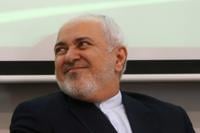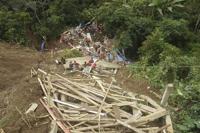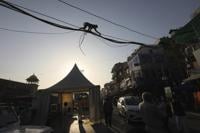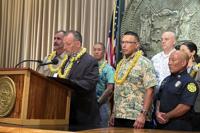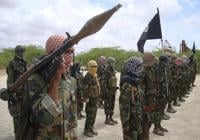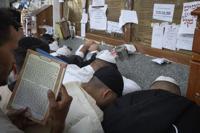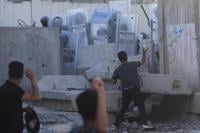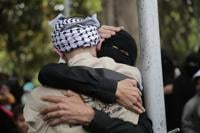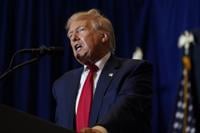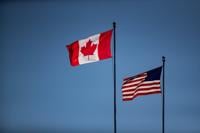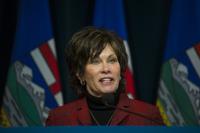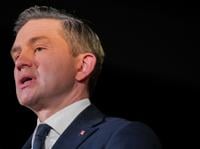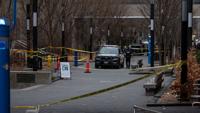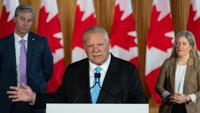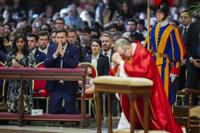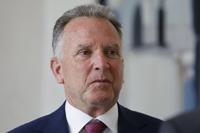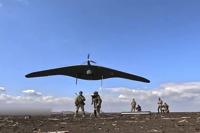DUBAI, United Arab Emirates (AP) — Iran confirmed Wednesday that the next round of nuclear talks with the United States this weekend will be held in Rome after earlier confusion over where the negotiations would be held.
The announcement by Iranian state television came as Iran's President formally approved the resignation of one of his vice presidents who served as Tehran's key negotiator in its 2015 nuclear deal with world powers.
The head of the United Nations' nuclear watchdog, Rafael Mariano Grossi of the International Atomic Energy Agency, also arrived in the Islamic Republic on Wednesday. His talks may include under any proposed deal.
The state TV announcement said Oman will again mediate the talks on Saturday in Rome. Oman's foreign minister served as an interlocutor between the two sides at talks last weekend in Muscat, the sultanate's capital.
Officials initially on Monday identified Rome as hosting the negotiations, only for . American officials so far haven’t said publicly where the talks will be held, though Trump did call on Tuesday, while the ruler was on a trip to the Netherlands.
The stakes of the negotiations couldn’t be higher for the two nations . U.S. President Donald Trump repeatedly has threatened targeting Iran’s nuclear program if a deal isn’t reached. Iranian officials with their stockpile of uranium enriched to near weapons-grade levels.
Pezeshkian praises former vice president while acknowledging his resignation
The former vice president, Mohammad Javad Zarif, served as a key supporter of Pezeshkian in his election last year but drew criticism from hard-liners within Iran's Shiite theocracy, who long have alleged Zarif gave away too much in negotiations.
In March, . However, the president did not immediately respond to the letter. Zarif has in his political career as leverage, including in a dispute last year over the composition of Pezeshkian’s Cabinet. The president had rejected that resignation.
But on late Tuesday, a statement from the presidency said Pezeshkian wrote Zarif a letter praising him but accepting his resignation.
“Pezeshkian emphasized that due to certain issues, his administration can no longer benefit from Zarif’s valuable knowledge and expertise,” a statement from the presidency said.
The president in a decree appointed Mohsen Ismaili, 59, to be his new vice president for strategic affairs. In Iran's political system, the president has multiple vice presidents. Ismaili is known as a political moderate and a legal expert.
Grossi visit comes as Iran has restricted IAEA access
Grossi arrived in Tehran for meetings with Pezeshkian and others. He met Wednesday night with Iran's Foreign Minister Abbas Araghchi, writing on the social platform X after the meeting: “Cooperation with (the IAEA) is indispensable to provide credible assurances about the peaceful nature of Iran’s nuclear programme at a time when diplomacy is urgently needed.”
Iran's state-run IRNA news agency described Araghchi as briefing Grossi on the first round of talks with the U.S., while also urging the IAEA to “adopt a clear and transparent stance regarding threats against Iran’s peaceful nuclear facilities.” Both Israel and the U.S. have threatened to attack Iran's nuclear sites if a deal can't be reached to limit Tehran's program.
“As variety of spoilers are gathered to derail current negotiations, we need a Director General of Peace,” Araghchi wrote on X. “Our predisposition is to trust Grossi in mission to keep the Agency away from politics and politicization, and to retain focus on its technical mandate.”
Since the nuclear deal’s collapse in 2018 with Trump's unilateral withdraw of the U.S. from the accord, Iran has abandoned all limits on its program, and enriches uranium to up to 60% purity — near weapons-grade levels of 90%.
Surveillance cameras installed by the IAEA have been disrupted, while Iran has barred some of the . Iranian officials also have increasingly threatened that they could pursue atomic weapons, something the West and the IAEA have been worried about for years since Tehran abandoned an organized weapons program in 2003.
Any possible deal between Iran and the U.S. likely would need to rely on the IAEA's expertise to ensure Tehran's compliance. And despite tensions between Iran and the agency, its access has not been entirely revoked.
Iran's foreign minister questions contradictory responses from US envoy
Meanwhile, Araghchi on Wednesday warned the U.S. about taking contradictory stances in the talks.
That likely refers to comments from U.S. Mideast envoy Steve Witkoff, who this week initially suggested a deal could see Iran go back to 3.67% uranium enrichment — like in the 2015 deal reached by the Obama administration. Witkoff then followed up with saying "a deal with Iran will only be completed if it is a Trump deal.”
“Iran must stop and eliminate its nuclear enrichment and weaponization program,” he wrote on X. “It is imperative for the world that we create a tough, fair deal that will endure, and that is what President Trump has asked me to do.”
Araghchi warned America about taking any “contradictory and opposing stances” in the talks.
“What is certain is that Iran’s enrichment (program) is a real, accepted matter," he said. "We are prepared to build trust and address any potential concerns, but the core issue of enrichment itself is not negotiable.”
___
Karimi reported from Tehran, Iran. Associated Press writer Amir Vahdat in Tehran contributed to this report.


